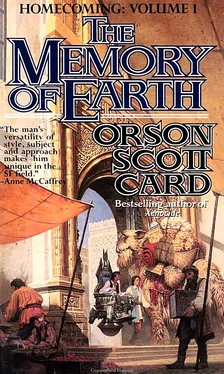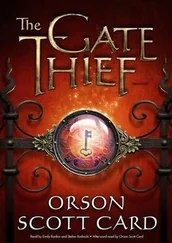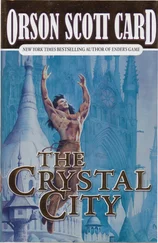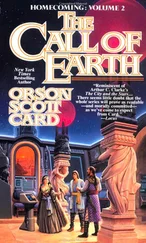Orson Card - The Memory of Earth
Здесь есть возможность читать онлайн «Orson Card - The Memory of Earth» весь текст электронной книги совершенно бесплатно (целиком полную версию без сокращений). В некоторых случаях можно слушать аудио, скачать через торрент в формате fb2 и присутствует краткое содержание. Жанр: Фантастика и фэнтези, на английском языке. Описание произведения, (предисловие) а так же отзывы посетителей доступны на портале библиотеки ЛибКат.
- Название:The Memory of Earth
- Автор:
- Жанр:
- Год:неизвестен
- ISBN:нет данных
- Рейтинг книги:5 / 5. Голосов: 1
-
Избранное:Добавить в избранное
- Отзывы:
-
Ваша оценка:
- 100
- 1
- 2
- 3
- 4
- 5
The Memory of Earth: краткое содержание, описание и аннотация
Предлагаем к чтению аннотацию, описание, краткое содержание или предисловие (зависит от того, что написал сам автор книги «The Memory of Earth»). Если вы не нашли необходимую информацию о книге — напишите в комментариях, мы постараемся отыскать её.
The Memory of Earth — читать онлайн бесплатно полную книгу (весь текст) целиком
Ниже представлен текст книги, разбитый по страницам. Система сохранения места последней прочитанной страницы, позволяет с удобством читать онлайн бесплатно книгу «The Memory of Earth», без необходимости каждый раз заново искать на чём Вы остановились. Поставьте закладку, и сможете в любой момент перейти на страницу, на которой закончили чтение.
Интервал:
Закладка:
"I've just realized something," said Nafai.
Issib didn't answer-he was far enough ahead that Nafai wasn't sure he could even hear. But Nafai went ahead and said it anyway, speaking even more softly, because he was probably saying it only to himself. T think that I say those things that make people so angry, not because I really mean them, but because I simply thought of a clever way to say them. It's a kind of art, to think of the perfect way to say an idea, and when you think of it then you have to say it, because words don't exist until you say them."
"A pretty feeble kind of art, Nyef, and I say you should give it up before it gets you killed."
So Issib was listening, after all.
"For a big strong guy you sure take a long time getting up Ridge Road to Market Street," said Issib.
"I was thinking," said Nafai.
"You really ought to learn how to think and walk at the same time."
Nafai reached the top of the road, where Issib was waiting. I really was dawdling, he thought. I'm not even out of breath.
But because Issib had paused there, Nafai also waited, turning as Issib had turned, to look back down the road they had just traveled. Ridge Road was named exactly right, since it ran along a ridge that sloped down toward the great well-watered coastal plain. It was a clear morning, and from the crest they could see all the way to the ocean, with a patchwork quilt of farms and orchards, stitched with roads and knotted with towns and villages, spread out like a bedcover between the mountains and the sea. Looking down Ridge Road they could see the long line of farmers coming up for market, leading strings of pack animals. If Nafai and Issib had delayed even ten minutes more they would have had to make this trip in the noise and stink of horses, donkeys, mules, and kurelomi, the swearing of the men and the gossip of the women. Once that had been a pleasure, but Nafai had traveled with them often enough to know that the gossip and the swearing were always the same. Not everything that comes from a garden is a rose.
Issib turned to the west, and so did Nafai, to see a landscape as opposite as any could possibly be: the jumbled rocky plateau of the Besporyadok, the near- waterless waste that went on and on toward the west. A thousand poets at least had made the same observation, that die sun rose from the sea, surrounded by jewels of light dancing on the water, and then settled down in red fire in the west, lost in the dust that was always blowing across the desert. But Nafai always thought that, at least where weather was concerned, the sun ought to. go the other way. It didn't bring water from the ocean to the land-it brought dry fire from the desert toward the sea.
The vanguard of the market crowd was close enough now that they could hear the drivers and the donkeys. So they turned and started walking toward Basilica, sections of the redrock wall shining in the first rays of sunlight. Basilica, where the forested mountains of the north met the desert of the west and the garden seacoast of the east. How the poets had sung of this place: Basilica, the City of Women, the Harbor of Mists, Red-walled Garden of the Oversold, the haven where all the waters of the world come together to conceive new clouds, to pour out fresh water again over the earth.
Or, as Mebbekew put it, the best town in the world for getting laid.
The path between the Market Gate of Basilica and the Wetchik house on Ridge Road had never changed in all these years-Nafai knew when as much as a stone of it had been changed. But when Nafai turned thirteen, he had readied a turning point that changed the meaning of that road. At thirteen, even the most promising boys went to live with their fathers, leaving their schooling behind forever. The only ones who remained behind were the ones who meant to reject a man's trade and become scholars. When Nafai was eight he had pleaded to live with his father, at thirteen he argued die other way. No, I haven't decided to be a scholar, he said, but I also haven't decided not to be. Why should I decide now?
Let me live with you, Father, if I must-but let me also stay at Mother's school until things become clearer. You don't need me in your work, the way you need Elemak. And I don't want to be another Mebbekew.
So, though the path between Father's house and the city was unchanged, Nafai now walked it in the other direction. The round trip now wasn't from Rasa's city house out into the country and back again; now it was a trek from Wetchik's country house into the city. Even though he actually owned more possessions in the city- all his books, papers, tools, and toys-and often slept three or four of the eight nights of the week there, home was Father's house now.
Which was inevitable. No man could call anything in Basilica truly his own; everything came as a gift from a woman. And even a man who, like Father, had every reason to feel secure with a mate of many years-even he could never truly be at home in Basilica, because of the lake. The deep rift valley in the heart of the city-the reason why the city existed at all-took half the space within Basilica's walls, and no man could ever go there, no man could even walk into the surrounding forest far enough to catch a glimpse of the shining water. If it did shine. For all Nafai knew, the rift valley was so deep that sunlight never touched the waters of the lake of Basilica.
No place can ever be home if there is a place within it where you are forbidden to go. No man is ever truly a citizen of Basilica. And I am becoming a stranger in my mother's house.
Elemak had spoken often, in years past, about cities where men owned everything, places where men had many wives and the wives had no choice about renewing their marriage contracts, and even one city where there was no marriage at all, but any man could take any woman and she was forbidden to refuse him unless she was already pregnant. Nafai wondered, though, if any of those stories was true. For why would women ever submit themselves to such treatment? Could it be that the women of Basilica were so much stronger than the women of any other place? Or were the men of this place weaker or more timid than the men of other cities?
Suddenly it became a question of great urgency. "Have you ever slept with a woman, Issya?"
Issib didn't answer.
"I just wondered," said Nafai.
Issib said nothing.
"I'm trying to figure put what's so wonderful about the women of Basilica that a man like Elya keeps coming back here when he could live in one of those places where men have their way all the rime."
Only now did Issib answer. "In the first place, Nafai, there is no place where men have their way all the time. There are places where men pretend to have their way and women pretend to let them, just as women here pretend to have their way and men pretend to let them."
That was an interesting thought. It had never occurred to Nafai that perhaps things weren't as one-sided and simple as they seemed. But Issib hadn't finished, and Nafai wanted to hear the rest. "And in the second place?"
"In the second place, Nyef, Mother and Father did find an auntie for me several years ago and to be frank, it isn't all it's cracked up to be."
That wasn't what Nafai wanted to hear. "Meb seems to think it is."
"Meb has no brain," said Issib, "he simply goes wherever his most protuberant part leads him. Sometimes that means that he follows his nose, but usually not."
"What was it like?"
"It was nice. She was very sweet. But I didn't love her." Issib seemed a bit sad about it. "I felt like it was something being done to me, instead of something we were doing together."
"Was that because of ..."
"Because I'm a cripple? Partly, I suppose, though she did teach me how to give pleasure in return and said I did surprisingly well. You'll probably enjoy it just like Meb."
Читать дальшеИнтервал:
Закладка:
Похожие книги на «The Memory of Earth»
Представляем Вашему вниманию похожие книги на «The Memory of Earth» списком для выбора. Мы отобрали схожую по названию и смыслу литературу в надежде предоставить читателям больше вариантов отыскать новые, интересные, ещё непрочитанные произведения.
Обсуждение, отзывы о книге «The Memory of Earth» и просто собственные мнения читателей. Оставьте ваши комментарии, напишите, что Вы думаете о произведении, его смысле или главных героях. Укажите что конкретно понравилось, а что нет, и почему Вы так считаете.









